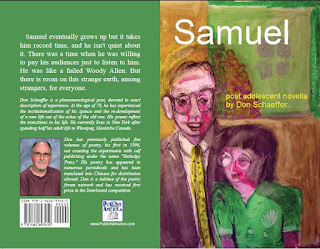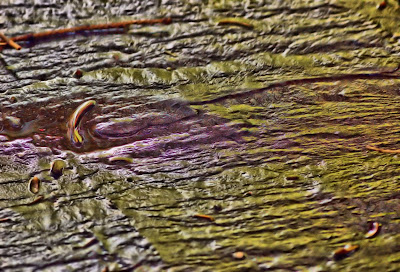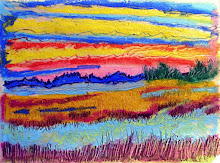Saturday, December 29, 2012
The Mourning Words: Short short story
http://www.shuttertalk.com/forums/Thread-The-Mourning-Words-Short-short-story?pid=85154#pid85154
Tuesday, December 25, 2012
Spring Horse
I ever saw a crippled spring horse.
which I trailered home to fix.
I found again that little lonely spring.
Friday, November 16, 2012
Wednesday, November 7, 2012
Moshe the Invisible
Monday, September 24, 2012
Thursday, September 20, 2012
A Du Maurier:
This is micro fiction by a poet who has been in here with his distinctive style several times. Warning, he is very sad.
Back on the highway, when I’d hitchhiked with Nicole and October ate the last bits of meat left on the bones of summer, the sky was a smoke grey. The smudge of the sky held nothing but charcoal. It smudged out all the sunlight. The wispy quality of autumn clung to our hair and rosy knuckles. I’d wanted to quit smoking a week earlier, and had tried. I’d thrown a package of Drum rolling tobacco disdainfully into a puddle and in the cold wind where transport trucks clattered with angry pistons and the air smelled of diesel, we had watched as the reddish tobacco stuck out haphazardly like a lost toupee. I hadn’t smoked in a week and the dust and the carcinogens were beginning to expunge themselves in my yellowy spit. Our noses ran on annoyingly like late night television. She seemed to me to be my left arm. I had dreamt the night we’d slept in the semi-trailer of a transport truck that a car had torn off her right arm in a midnight accident, leaking like a slit open pomegranate with beads of blood through red and black plaid. A red middle-class pseudo-sports car pulled up. We got used to these new faces. He was as bored and drained by the fat leech of impending winter as we were. He offered me a smoke and I pretended to acquiesce, in hopes of eluding myself. I lit the cigarette with the push in electric lighter. A Du Maurier, I always thought that they tasted the way urine smells after drinking a Colt 45. I smoked it anyway. It was a sickly dizziness that deadened my face with a cadaverous ghostliness. The smoke like a serpent slipped down my throat into my veins and I felt emptied, nothing mattered then. I thought of Nicole as the smoke rose, then I inhaled.
Friday, September 7, 2012
Friday, May 25, 2012
Not a Bad Way to Begin a Morning
The thing, we think, to do with puzzles
is to nuzzle them affectionately,
wake them up at dawn while nobody
has anything much on – kiss their little lips
and let them know whatever slips
between you will be reconnoitered with
in privacy. Soon whatever you had
thought the point was to pursue will lose
its primacy and be replaced by something
like a clue – gently, without warning,
stretching its accoutrements, and yawning.
Not a bad way to begin a morning.
What I’d Call a ‘Myself’
Keeps missing whatever I’d call a ‘myself.’
Second might do,
through its sneaky ambiguous usage of ‘you.’
‘One’ has a sort of a Jamesian tone,
but it sits rather too much aloofly alone.
Personal pronouns keep missing the bus:
they only report what purports to be ‘us.’
So I tried to look ‘I’ in the eye.
I drew what I saw in the mirror. Oh my.
Something looks back from the page.
Quiet, polite – but in covert outrage.
Sunday, May 6, 2012
Saturday, May 5, 2012
"Samuel" a post adolescent novella
smile with narrow evil eyes
resident post-beat poet
I do feel better- tag the tarred
esoteric goulash- bitter monkey onions
Hero sham there in the tallow candle wax
among the dust
each feathered crocus
onomatopoeia
so many empty hopes in
dreams of large, veiny branches
not positive
or unhappy
just pain painted white
here in the shame belly
a dignified toad eye smile receptacle
against all the natural laws
physics like icicle chains
in eskimo politically correct lobotomy rainbow
- smile with narrow evil eyes
Friday, March 16, 2012
A Child’s First Vision of Death
by Tom Prime
A "short story"
We grew up on an asphalt black mouthed hill with a tongue filled with white people's families. I don’t remember when the forest fell but I imagined it to be once populated with the greatness of violent sacrilegious natives combing its gnarled and blackened earthen stomach. I imagined where we rushed about among the sparse etchings of ravaged limbs, a free world, existing symbiotic with every color of dirt and moss and rainbow through dewdrop. We crafted crude, innocuous idols of death's wizened finger. Bow and arrows and bombs of old paint and gasoline, ours was a world of hidden wars, forts of plywood and wings of cardboard refusing to extol our battle against the clenched fists of science with flight- the arching womb of innocence. A long plastic intestinal drainage pipe ran down our muscular eye of reality into the earth beneath the suburbs, dense with the power and authority of a world separate from our own. Curry smelling immigrants separate, disconnected, impossible to understand but forgotten quickly with parental cautionary reproof- the dangerous world of escaping adversity. The run off of British Columbian grey skies seeped like long strands of dirty black and greasy hair down the monumental adolescent hill- half a kilometer. My brother and I lacking maturity and physical understanding looked down the black snake mouth and thought as thin and wispy and as careless as the shifting winds. Climbing into the coiling rubber walls among the sludge and evaporating rainwater we looked into the great eye of death and turned away.
Thursday, February 9, 2012
I kinda got killed by a dragon
Tom has appeared here before. He is a latter day beat poet, brimming with energy, searching for regeneracy, self-defense, and self-destruction. This is one of his shorter works.
Don't you bleed ever so quietly? Much to my
dismay I kinda got killed by a dragon. It is as
much a confusing dismal world as round faced
sponge colored toads- I swallowed and fire extinguisher
eyes released hot steam sauna rock water. I tadpoled
in missionary mourning- glued into gelatin bodies- hear
the kerosene stove hissing like a misanthropic raccoon
in heat of rusty tear nail drops.
I kinda got killed by a dragon-
Wednesday, February 1, 2012
Thursday, January 12, 2012
Captive Monkeys
The poet drove a commuter bus between NJ and NYC for 14 years. In 1991 he shifted into a corporate sales career in communications. In 2002 Lee opened a small restaurant, Dale's Cafe, (named after my wife) in Bartonsville PA in the Poconos. He has been married to Dale Ann (Derby) since 1983. They have seven children. His eighth grandchild is due February, 2012.
Captive monkeys jack off in daylight,
indifferent to anyone watching.
Captive monkeys toss feces out of boredom.
They give furry-faced stares,
mirrors of our predicaments
jaded from jungle undelivered.
Some captive monkeys have imagination.
They sit their bald asses on platforms.
With keypads, remotes and dexterity
they simulate wildness into their zoological digs.
They elevate the playing with shit into a game of war.
The act of jacking off becomes an art of ritual.
We sense a new fierceness in their eyes.















